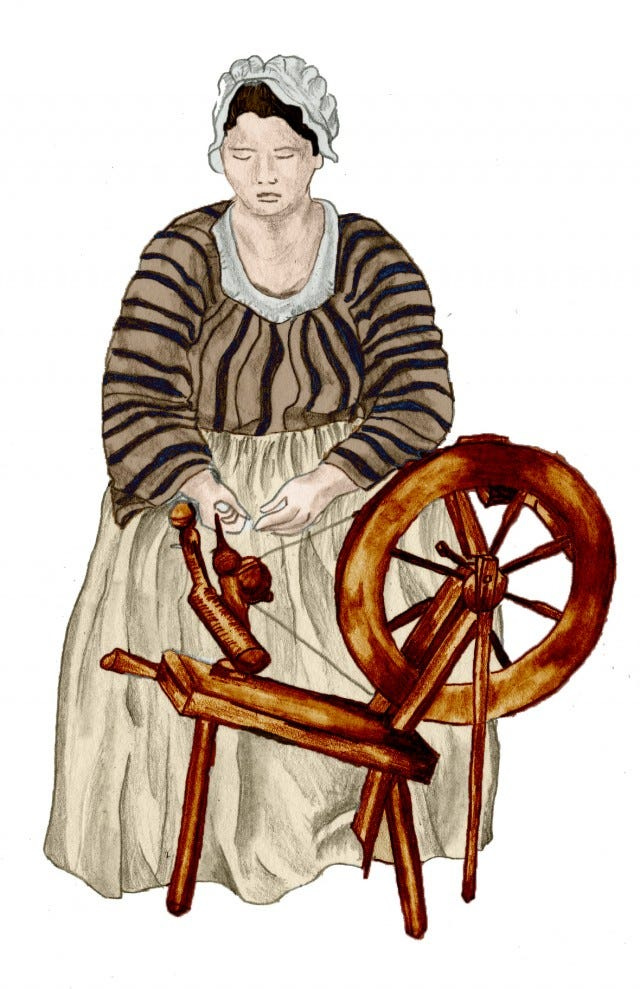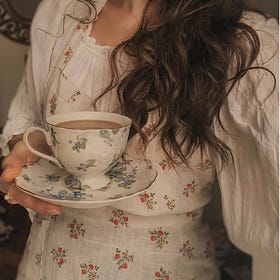How Both Feminists And Tradwives Are Getting Femininity Wrong
On domesticity, feminized labor, and women's work
Kyla Wazana Tompkins was one of my first interview subjects at In Pursuit. Back in the golden days of 2022, we talked about conservative Christian influencers, trad wives, and the ways in which nostalgic imagery functions in tandem with oppressive ideologies. To this day, it’s one of my favorite interviews, and Kyla’s work has hugely informed how I approach trad criticism.
is an author, the chair of gender studies at the University of Buffalo, and the executive producer of the Feminist Keywords podcast (see this ep about sex work!). She has a new book coming out called Deviant Matter: Ferment, Intoxicants, Jelly, and Rot, which “draws from the genealogy of Black feminist and queer of color critique . . . for thinking about how matter, art, politics, and affect can be read across multiple scales, ranging from the intimate and molecular everyday to the vast print production and inner workings of the state.” Kyla’s essay on boba (certainly gooey!) is one of those brilliant essays that seems to be about food but is actually about everything, so I’m so excited to read Deviant Matter.Join us for a conversation about domesticity, macerated berries, and the one thing feminists and trad wives have in common.
Sara
So Kyla, I asked you what a shrub was the other day. And not the type that’s a plant.
Kyla
Ok so a shrub is an old English and early American drink that’s made from macerating fruit in sugar or soaking it in honey for a few days and then extracting the juice, which you then mix in more or less equal parts with vinegar. Then you mix it with soda or water. It’s a drink that hipster bartenders have rediscovered but it’s a really old drink because it’s so easy to make and such a good way to preserve fruit.
Sara
Totally. And our little back and forth about shrubs made you suggest we talk about our relationships to, like, the domestic arts. And of course, I said YES. Would it be fair to say that domesticity is a little FRAUGHT right now? In mainstream media, at least?
Kyla
Well, of course I’ve been turned on to the trad mom bonanza through conversations with you and by following your work. And it’s interesting to see these old arguments revived online about the value of women’s labor, or maybe we might say, the value of feminized labor.

Sara
Can you talk me through why you distinguished between feminized labor and women’s labor? I think this is really important.
Kyla
I guess I’ve been wondering for a long time about my own attraction to forms of domestic work that are attached to earlier, less commercial and less industrial, forms of capitalism for a while. And they are often attached, in the modern period, to women who are stay at home moms, or in the contemporary moment, to so-called trad moms who seem to be enacting a fantasy of living in as self-sufficient way as possible outside of dependence on industrial, say, food. But I call it feminized because actually across history and geography this could be men’s labor too. I’m interested in extracting femininity from its association only with women because then we can get at larger patterns of devaluing forms of work that seem to gender the people who do that work.
Sara
Right. As you’re teasing this out for me, I’m trying to understand why it’s personally attractive for me to imagine my grandmother learning a craft, then teaching my mother, who passes it on to me. I think part of the reason we romanticize certain kinds of work that have historically been viewed as “women’s work” is because it’s a way of reclaiming very real skills, art forms, and even forms of soft power, right? There’s something that appeals to my feminist soul in imagining a coven of women bound by specific knowledge. But I think that’s worth interrogating. Like, am I less attracted to this type of thing if my grandmother also teaches my uncle embroidery (alongside my mother)?
Kyla
Threading this gendered needle, as it were, seems like more than the internet can do even on its best day. And what I really want to think about is if there is a way of reclaiming craft and reclaiming knowledge that seems worth not losing (like canning, preserving, gardening, darning, etc) while loosening its relationship to ideologies that actually seek to dampen gender liberation. What’s fascinating to me about this paradox - or is this a paradox? - is that both feminism and trad wife ideologies have fallen into the same trap, which is to see femininity as a subservient position, whether they seek to embrace that subservience or negate it.
Sara
RIGHT. Like, trad content is very explicit about embracing “women’s work” but only so far as it supports male-gendered labor. Like, the beauty of it (in trad parlance) is that it’s complimentary labor. Talk to me more about feminism seeing femininity as a subservient position.
Kyla
So this is something that trans theory and liberation movements have loosened up in queer and feminist theory: which is to analyze and critique how conservative gender ideology actually consistently focuses on and punishes or preys on femme people regardless of their gender, as opposed to discussing violence as only targeting women more than men (this even more complicated by race).
Like, femininity is an invitation to violence or extraction in the world in ways that masculinity is (often but not always) not. And feminism in its second wave, and certainly lesbian worlds that celebrated butch/femme relationships often fell prey to the same mistake: not seeing the stunning brilliance and everyday creativity inherent to how femme/femininity actually functions in the world. So for instance, women need to enter the workforce! Equal pay for work of equal value! These are important and continue to be trenchant slogans. But what they actually leave behind is the social and economic value of domestic labor, as well as the ongoing existence and value of care labor across many scales. They assume a liberation model that recenters and values masculinity.
Sara
I get stuck on the definition of femininity vs. the definition of domesticity. Like, can you explain how femme-ness/femininity functions in the world vs. how domestic labor functions? Have they just been so historically melded together that it’s impossible to divorce them from each other?
Kyla
I think that’s exactly it: femininity and domesticity have been melded together and devalued together. Hence: the impossible problem of femininity for women in leadership positions. How to be feminine without giving up power, while not being so un-feminine that you also give up power. But what if femme-ness or femininity is your power? And then this brings me back to the ambivalence so many of us wrestle with vis-a-vis economically devalued forms of work, such as what turn of the 20th century feminists sought to call home economics, in a real effort to reclaim its actual monetary value. Am I capitulating to some socially devalued form of gender if I love work that is historically attached to it; and the other trap is the one laid by the trad wife mafia, that to devalue or question their project is to devalue their agency in choosing it.
Sara
Sorry I’m loling over “trad wife mafia.” Um YEAH, I don’t understand why so many trad defenders seem to think that feminism = always agreeing with all women’s choices. A month or two ago,
wrote this, which I really appreciated:But it’s also possible to make sourdough bread and advocate for climate justice. One can value barefoot, frolicking, fire-building children and women’s bodily autonomy. One can milk a cow and collect eggs and also run for office in the local government in order to pass progressive legislation that protects trans kids and common-sense gun laws. One can check their spending power, and their relationship to consumer culture without being hyper-individualistic or devoted to upholding the patriarchy or spreading conspiracy theories. People do it every day!
And I think this trap - of believing that domestic arts MUST go hand-in-hand with regressive gender roles and beliefs - has everything to do with the ways in which both femininity AND domestic labor have been culturally devalued. This might be a tangent - but I keep imagining a John Wayne type dude hanging laundry on a line in the sun - and I imagine myself thinking that he’s out of place in that image - that he should be replaced by a femme person. But this is nonsense of course, and I think speaks to our limited memories, and the way we attach emotionally to relatively recent gender constructs. Like, for most of human history, all genders were hanging laundry, right?
Kyla
Well, segregating labor according to gender seems to have a long history but as you point out that fails to account for how people living in gender-segregated worlds (sailors or nuns for instance) inevitably must perform labor across traditional gender lines. But also it does seem that what we call trad wife ideology, which feminist literary scholars of U.S. literature would call “the cult of true womanhood” does seem to emerge alongside the economic devaluation of white women’s domestic labor, as more white women and more rural people entered cities and engaged in industrial labor. So it might have been feminized labor to for instance know how to churn butter or make cheese or quilt, but when your family died if you couldn’t do that, it wasn’t so aesthetic. It was life or death.
Sara
Wow, words to live by. THE LIMITS OF AESTHETICS. When I engage in domestic labor for pleasure - knitting - gardening - mending - I can’t emphasize how little gender performance has to do with it. Like, I’m never less gendered then when my body/hands are engaged. So it’s really funny to consider the gendered imagery of a woman knitting by the fire or whatever with the reality of the skill/labor itself.
How To Be The Best Domestic Goddess
Kyla
My relation to it is slightly different: I feel like I honor femininity when I honor crafts traditionally deemed feminine. And I actually long for a world that values that work too without seeking to punish me economically or politically for loving to create in those ways.
Sara
No, I completely get that. And I agree with it! I think I’m referring to the ways in which pop culture equates self-erasure with domestic labor. Like, when I knit (for example), it’s so so pleasurable. I’m not doing it so that I think of myself as a “good woman.” You know?
Kyla
It’s also like grueling work actually. Like my son is always mad at how messy my domestic arts are. And at the end my back hurts and my feet hurt, and I’ve burned myself. But yes: for me too the pleasure of creation. And I think there’s also something so seductive about doing movements that many generations of people have done before me.
Like I think a lot about when I was a very little girl and my great-grandmother used to babysit me a lot. And she had the habit of always calling me into the kitchen and training me and modeling for me how to move inside a kitchen. She would, for instance, say, and I can still hear her voice (English was like her fourth language): my dear, always to put the kettle on the fire. By which she meant: if you move something off an element, put the kettle on it so that you don’t burn yourself. And this very pedestrian everyday form of small wisdom is for me the quintessence of femme/feminine life: how scaled down and intimate it can be, but how it ties you to who came before.
Sara
Absolutely. And really, that has less to do with gender and just more to do with loved ones and ancestry. But there is something beautiful or connective about the ways in which femme people have created a tapestry of knowledge and skills amongst themselves throughout history.
Kyla
Yes and what sucks about trad wives is like, I am totally here for them to have those same pleasures, and I am here for them to make their life choices even to the extent that they wish to negate their own political power, or seem to perform that negation. But those women will never be there for me.
I affirm a pregnant person’s right to free abortion on demand; and I affirm trans liberation, and I want an end to prisons, and I want sexual liberation for everyone. And so many of these trad women actually defend their lives as “choice” but in actuality, they are committed to social and religious movements that seek to foreclose choice. So I want them to have their choices, and they don’t want me to have mine.
But what’s weird is that we both want to make rhubarb shrub. Haha.







Many 'domestic' tasks/pleasures are very meditative, indeed. Elizabeth Gilbert spoke beautifully about aesthetics and creativity in the domestic sphere in a interview in On Being a few years back. Lost of nuanced and important stuff in your conversation that I will read and consider further. I believe pre-industrialized revolution that for working people the task division wasn't quite so pronounced. And the more we can explore the concepts of femininity and masculinity as unique categories of expressing humanity, separate from body parts, and in each person in different mixes, we can get out of the boxes of gender expectations that are prisons for all.
As a longtime knitter and sewer and a person who loves to make baked goods, I appreciate this so so much! I came up in the DIY, early-Etsy movement of punk craft shows ( I left my job to sell handmade yarn! I built a business!)…and it felt like an aspect of my feminism. (See: Bust Magazine and Debbie Stollar’s knitting books)
To see the tradwives/homesteaders kind of..colonize the world of craft/baking/gardening on the internet has been such a bummer.
(I would love to read a study of this timeline! Did early Etsyers become homesteaders? Is it the younger generation who grew up with their moms or older sisters stitching and bitching?)